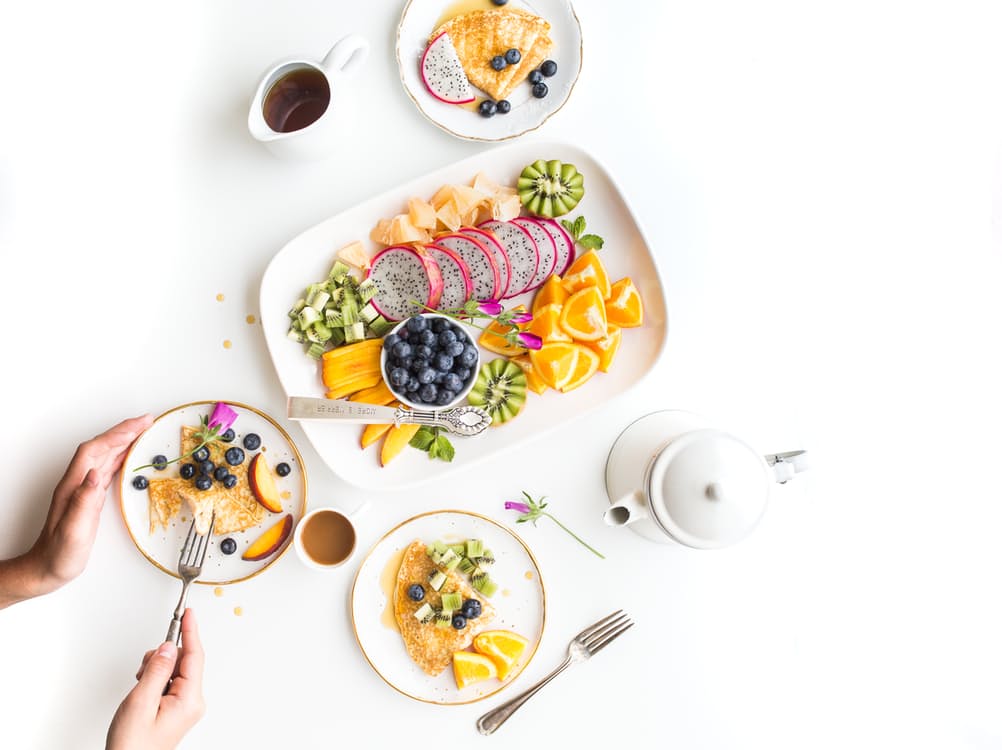
I have always been amazed by the seemingly endless diet trends in this country. I remember that all the major food trends I was ever exposed to growing up in Europe came from the U.S. They often didn’t just come with dietary rules but included a plethora of cookbooks, food products, t-shirts, mugs, and other branded items to “complete” what was more than just a diet.
It can indeed be overwhelming and sometimes even impossible to figure out which of these diet trends are based on facts and which just have a really strong marketing strategy behind them.
When it comes to the vegan diet, I find it fascinating how many subcategories there are: low fat, high carb, starch solution, raw, raw till 4, high protein–and the list goes on. What most of these fad diets and dietary trends have in common is that they convey that certain types of food, or even entire categories of macronutrients, are “bad” and to be avoided.
I want to spend some time in this article debunking some of the vegan dietary trends and empowering you with a couple easy thought mechanisms that can help you navigate this space and make long-term, sustainable decisions instead of getting bogged down in (false!) rules and regulations.
The problem with diets that promote high-protein, high-carb, or high-fat is that they basically take one of the three macronutrients (carbohydrates, fat, protein) and put them on a pedestal while conveying that the other two macronutrients should be avoided. The first issue this creates is that people start thinking of food in a black and white way. In addition, such diets make it look like some foods are purely made of carbs and some purely are made out of protein or fat. But the truth is, these are macronutrients, and most foods contain all three of them. There is protein in broccoli–not just in tofu, just to give you an example. This type of thinking leads to obsessions with certain nutrients when truthfully, our body needs a mix of macro- and micronutrients. Cutting out an entire macronutrient category is quite absurd.
From a purely nutritional perspective, I do think it’s a good thing to think about certain foods as a base of your diet. Getting most of your calories from whole grains and starches, as well as veggies, beans, and fruit, for example, has been scientifically proven to promote health, and help with weight loss and weight maintenance. This type of diet is endorsed by numerous doctors, including John McDougall and Michael Greger, who have dedicated their entire medical careers to independent research in order to identify the most health-supportive and disease-preventive diet. And guess what? It’s all pretty simple (and cheap!): eat whole plant-based foods, limit added refined sugars and fats from oils, and limit processed foods in general.
Other vegan diets such as the raw diet or the raw till 4 diet (which basically consists of eating raw food all day and then a cooked dinner) can seem overly restrictive, especially if you live in a place like NYC, where we don’t have the same access to fresh fruit and produce year-round (unlike, say, Hawaii or other tropical areas of the world). In addition, it can be tough to totally cut out cooked foods in cold climates, and the truth is, certain nutrients have better absorption rates when the foods they come in are cooked. I believe that eating raw plants is good, but exclusively raw can be a challenge. It’s also not always feasible in terms of getting enough calories (you need to eat pretty large quantities) and can hence lead to feeling sluggish and tired, which is not what a vegan diet should be about.
The challenge with all these trends is that they put things into boxes and label them as good or bad. That’s not what diet should be about. A good friend of mine, who suffered from an eating disorder, told me that she didn’t know if going vegan was the right thing for her because there are all these “restrictions,” and she was clearly referring to all these different trends. Following a seemingly healthy, but again, restrictive diet could potentially trigger her disorder to come back.
I don’t want anyone to be turned off by veganism because some people claim that we should only eat protein while others say that exclusively eating raw foods leads to absolute bliss. I want all vegans to chill out and really ask ourselves if these labels are healthy and sustainable ways of thinking about diet, or if instead, they might be leading to more confusion and ultimately turn people off from going vegan at all.
A diet needs to be intuitive, it needs to be feasible–geographically and socially–and it needs to nourish you without causing you undue stress. I like to stick to the basics, which aren’t always the most glamorous but will work for everyone. I don’t count calories or macronutrients; rather, I focus on eating real and unprocessed plant foods, and I avoid demonizing any foods. This approach has allowed me to joyfully sustain and thrive on a healthy, non-restrictive vegan diet.
Have you tried fad diets only to give them up for a simpler way of eating?
Also by Isabelle: Finally, Some #Realtalk About Protein & Why You Shouldn’t Stress Over It
Cut Your Grocery Bill In 1/2 With These Genius Vegan Shopping Hacks
Related: Here’s The Proof That A Vegan Diet Makes You Fabulous At Every Age
Get more like this—Subscribe to our daily inspirational newsletter for exclusive content!
__
Photo: Pexels




